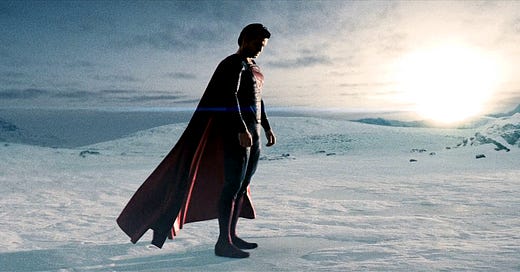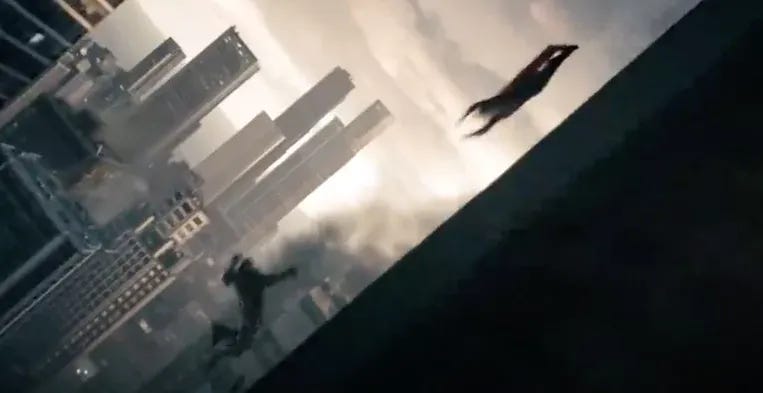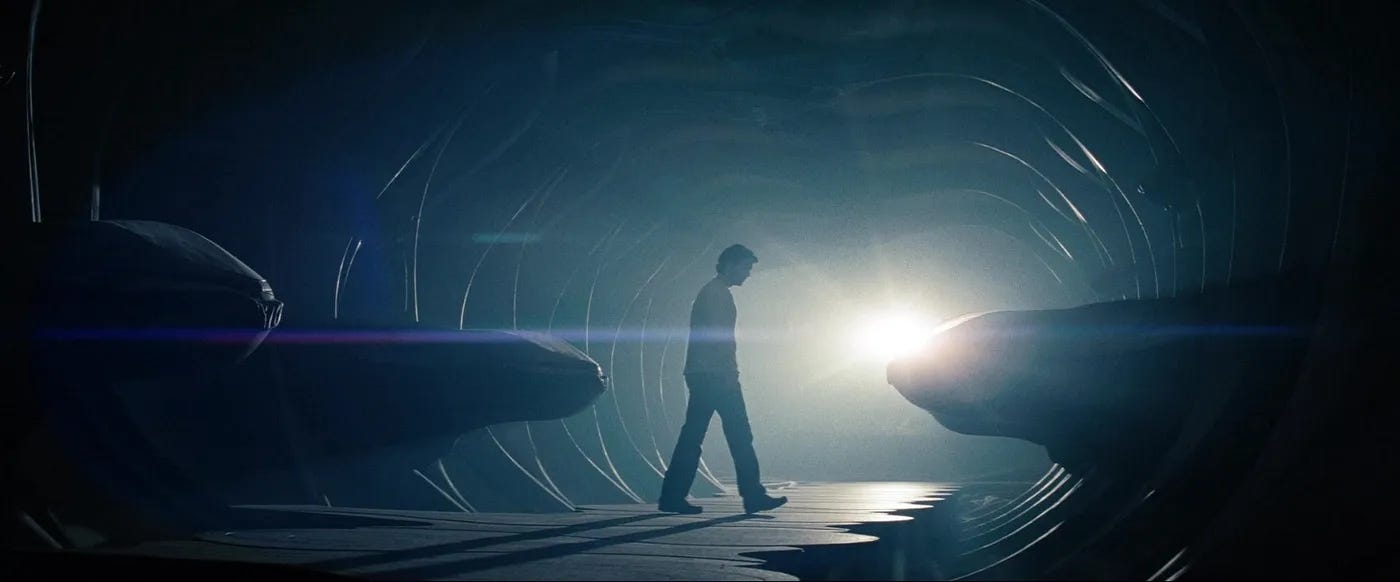The Forgotten Tale of Man of Steel [Part II]
Part 2: We are all Zods — On Losing Ourselves in the Roles We Never Chose.
In Part 1, I revisited Man of Steel through the lens of personal struggle — how a film I once watched in my early twenties unexpectedly mirrored the questions I still carry in my mid-thirties. Clark Kent’s quiet journey of self-discovery, shaped by love and restraint, reminded me that choosing who we become is often more heroic than any act of strength.
But not everyone in Man of Steel had that choice.
The film’s opening act reveals the impending collapse of Krypton. With the planet’s core destabilised and resources depleted, evacuation was no longer an option. Jor-El — Kal-El’s biological father — warns the ruling council of their doom, but his warnings are dismissed.
To preserve Krypton’s legacy, Jor-El makes a radical choice: he and Lara conceive a child naturally — Krypton's first in centuries — and infuse him with the Codex, a device containing the genetic blueprint of their entire race. This child, Kal-El, is not just a symbol of hope, but of rebellion: born free in a society where every citizen is engineered for a predetermined role.
On Krypton, no one chooses their destiny. Scientists are bred to be scientists. Soldiers like General Zod are born and programmed to protect. Jor-El and Zod may have shared the same desire — to save their people — but stood on opposite ends of a philosophical divide: one sought legacy through natural birth and freedom; the other, through authoritarian control and preservation of a dying order.
Later in the film, adult Clark learns from the simulated consciousness of Jor-El that the Codex was encoded into his very cells — not to dictate who he must be, but to empower him to choose.
"We've had a child, Zod," Jor-El says. "Krypton's first natural birth in centuries. He will be free — free to forge his own destiny."
“Heresy!” Zod bellows.
If Clark represents freedom and becoming, Zod represents its opposite: someone born into a purpose so rigid that he couldn’t survive its loss. In this part, I want to explore that contrast more deeply — how purpose, when imposed rather than discovered, can become a cage. And how, in Zod’s tragedy, I began to recognise something hauntingly familiar in myself.
Enter Zod: From Programming to Collapse
“I was bred to be a warrior, Kal. Trained my entire life to master my senses. Where did you train? ON A FARM?” — Zod
I used to think that not knowing your purpose was the heaviest burden you could carry, and having one would carve a meaningful path towards a fulfilling life. While the latter stands, I’ve come to learn that being told what your purpose should be — by systems, tradition, or the weight of other people’s expectations — can be just as crushing.
That’s what makes Zod’s arc in Man of Steel so haunting. He is not just the villain — he’s the product of a system that removes freedom from the equation. Bred and genetically engineered for military leadership, Zod was never taught how to become. He was programmed to be.
And when his final attempt to terraform Earth was thwarted by Superman, Krypton fell for good — and with it, so did his reason for being. The loss didn’t liberate him — it unmade him.
He didn’t fall because he was evil.
He fell because his identity had no room to grow.
If Clark Kent represents the possibility of becoming whoever we choose to be, then General Zod is the cautionary tale of what happens when choice is never given—or when one believes there is no choice at all.
This is the dualism at the heart of the film: Clark is the question — Who do I want to become? — Zod is the statement: You were born to be this, and only this.
And watching it now, I realise why it unsettled me so deeply.
A Life Scripted by Others
In my own life, I’ve often felt the weight of expectations I never asked for. Resonating with most of you, these expectations come from all directions — education systems, definitions of success, cultural ideals, moral codes, religious frameworks, and the unspoken roles we’re expected to play in our daily lives.
As a teenager, I learned the hard way that the only path to belonging was through excellence. I aced my studies, became the top student in a stream quietly looked down upon, and by the fourth year, I was one of the highest-performing students nationally within that same stream.
I was raised to be dutiful, responsible, to do what’s right — even if no one ever explained what right actually meant. My yearning for a meaningful life led me away from a creative career path and into social service. Somewhere deep in my subconscious, I believed that hard work would lead to recognition, that loyalty would open doors, that if I followed the “right” path, I’d eventually arrive at some promised version of success.
Until recently, I watched promotions were passed over for years, mentorship never came, and opportunities for growth were either withheld or redirected elsewhere. Our fates may have been written by the higher power — and that may be the beauty of choice. Yet, it still felt like I, too, had been programmed for a role I never chose.
And I think many of us feel this way — that we are held in place by the “reasons” we’ve internalised, unable to grow beyond the identities others have carved for us.
The more I tried to fit into that mould, the more I could feel my inner world shrinking. My creativity was buried. My dreams were postponed. My time was consumed by the demands of a system that never once stopped to ask who I truly was. Like Zod, I was living out a script. The only difference was: I was expected to be grateful for it.
We are all Zods: The Tragedy of Purpose Without Freedom
Zod doesn’t see himself as evil. He believes he is fulfilling his destiny — reviving Krypton, preserving its legacy, honouring his people — even if that means committing genocide on a planetary scale. But without the ability to adapt or imagine a life beyond that mission, he becomes monstrous.
“I honour the man you once were, not the monster you have become.” Jor-El described Zod best in the beginning of the film as the latter committed a coup d'état.
When Superman thwarts Zod’s genocidal intent by destroying the World Engine, Zod’s response isn’t just rage — it’s despair.
Clutching dust in his hand, Zod laments, his voice fractured, every word falling like a piece of his broken identity:
“Look at this. We could have built a new Krypton in this squalor, but you chose the humans over us. I exist only to protect Krypton. That is the sole purpose for which I was born. And every action I take, no matter how violent or how cruel, is for the greater good of my people.”
His tone rises, trembling in fury:
“And now... I have no people. My soul—that is what you have taken from me!”
This moment reveals Zod’s unravelling not as villainy, but as spiritual collapse. When purpose becomes singular, survival of the self becomes impossible once that purpose is gone.
What follows is the climactic battle — between Superman, the embodiment of free will, and Zod, the embodiment of determinism. Good versus evil, yes — but more than that: hope versus despair, identity versus programming, choice versus fate.
That haunts me.
Because what happens when the thing you were supposed to become never materialises? What happens when your “purpose” collapses under the weight of real life?
In the film, Superman stood in Zod’s way of accomplishing the one thing he was bred to do: ensure the survival of Krypton. But in real life, the setbacks that threaten to dismantle our sense of identity often come in forms far more irreversible.
Imagine the dream of building a family, shattered by a terminal cancer diagnosis.
The sudden death of a spouse just months into marriage.
An accident that strips away the dignity of a life once taken for granted.
Or — a dark night of the soul that leaves your spirit traumatised and seemingly beyond recovery.
And then there’s the world we live in now.
We witness poverty, famine, war, genocide, and oppression playing out across the globe. Unjust acts committed in the name of justice. Violence carried out under the guise of righteousness. Perhaps, at their root, these extremes stem from something quietly human: the inability to grow beyond inherited roles. When we cling too tightly to who we were told to be, the need to defend that identity — at all costs—can become dangerous. A refusal — or inability — to question what we’ve been programmed to do, and who we’ve been told to be.
This, I believe, is the shadow side of purpose.
When we define ourselves too rigidly — by job titles, social roles, cultural codes, or inherited ideals — we risk losing not just our direction, but our identity.
If Zod is the embodiment of what happens when identity is dictated, then Clark becomes the embodiment of what it means to define yourself in the absence of clarity.
My Own Kryptonite
I often think of Superman’s greatest weakness — Kryptonite — not as a glowing green rock, but as the invisible pressures that paralyse us. For me, Kryptonite looks like emails on my off days, family obligations that leave no space to breathe, performance reviews that never quite see you. It’s the heaviness of always being “strong” when you actually feel lost. It’s the guilt of wanting something more.
In those quiet hours — when the laptop’s light fades, and my writing dreams whisper back to life — I wonder if I’ve spent too many years trying to be what others needed, and not enough asking what I need to become. Maybe Zod couldn’t ask that question. Maybe I still can.
Coming to Terms with the Void
“But somewhere out there you have another father too, who gave you another name. And he sent you here for a reason, Clark. And even if it takes you the rest of your life, you owe it to yourself to find out what that reason is.” — Jonathan Kent
The difference between Zod and Clark isn’t power. It’s permission. Zod never had the chance to become anything beyond what he was programmed to be — even in his final moments, when Superman pleaded with him to stop, as he hovered on the brink of incinerating innocent lives.
But Clark — raised by the Kents, loved not for his abilities but for his humanity — was told something rare: You can choose.
Zod’s collapse is terrifying because it shows us what happens when purpose becomes a prison. But Clark’s journey reminds us that meaning isn’t something we inherit—it’s something we make. Slowly. Painfully. And sometimes in defiance of everything we were told.
I’m still learning how to choose. Still navigating the tension between duty and desire, between structure and soul. But if Man of Steel taught me anything, it’s that we don’t have to let the shadows define us — even if we come close.
In the final part of this series, I’ll return to where it all began — with the myth of Superman, and the reason his story has never stopped speaking to me. Because maybe being a Superman (or Superwoman) has less to do with saving the world — and more to do with saving a part of yourself.








True freedom isn’t the absence of constraint, it’s the result of disciplined mastery over self, where structure, sacrifice, and daily choices forge strength, peace, and the capacity to lead.
https://open.substack.com/pub/mondaymorningmeditations/p/monday-morning-meditation-the-paradox?utm_source=app-post-stats-page&r=5v3p00&utm_medium=ios